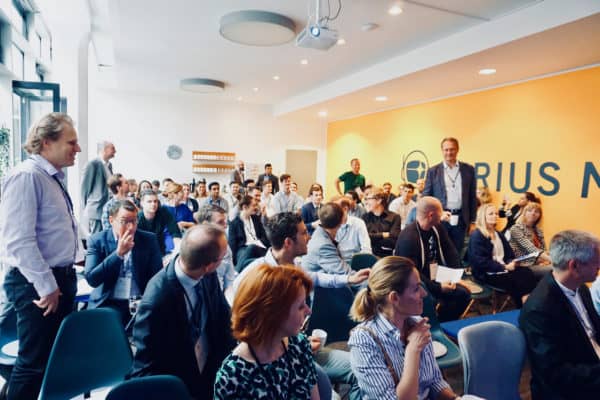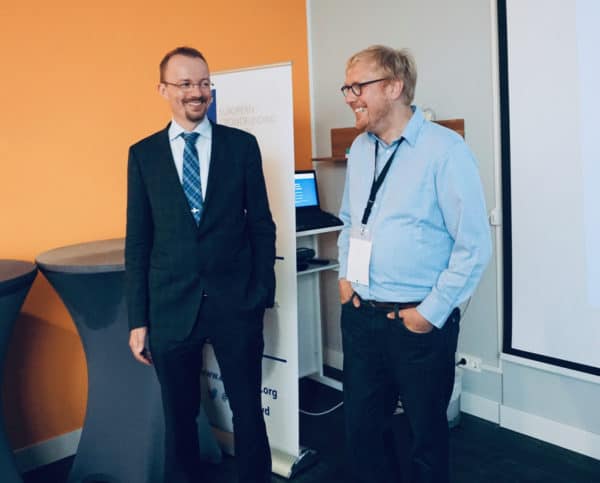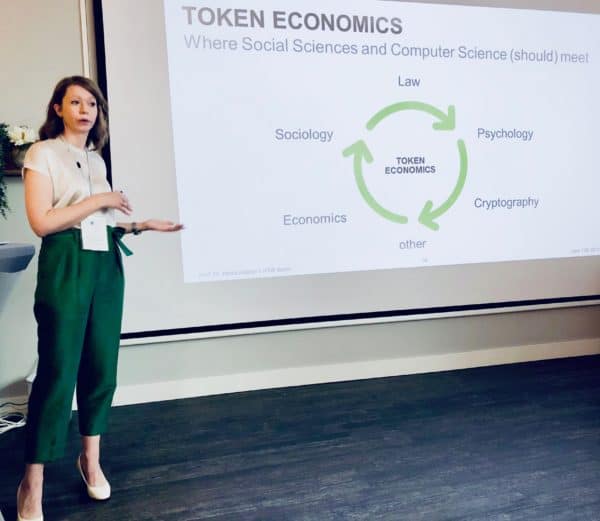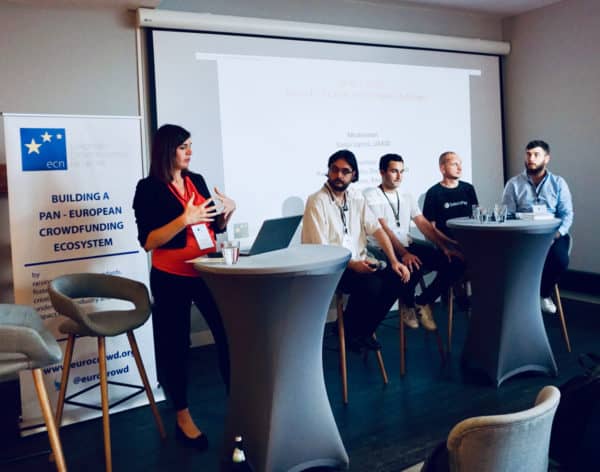This is a report from the 4th CrowdCamp of the European Crowdfunding Network (ECN) which took place on 13 June 2019 in Berlin.
Berlin – The rooms of Sirius Minds at the 4th CrowdCamp of the European Crowdfunding Network (ECN) were occupied to the last seat. This year the focus was on the effects of blockchain technology on alternative forms of financing and thus also on crowdfunding.
ECN Executive Director Oliver Gajda, Chair Christin Friedrich, and Dr. Conny Weber, co-leaders of the ECN working group “Exploring Blockchain for Alternative Finance“, invited to an open dialogue, which highlighted extensive aspects of the topic on different levels.
The European Crowdfunding Network was established in 2013 as an interest group. Today, the majority of European crowdfunding platforms are represented in the ECN and regularly exchange information in various event formats. In the form of working groups, the members work together to promote the interests of the industry, for example, in the context of harmonizing the European crowdfunding market (ECSPs) for equity and lending-based crowdfunding or co-matching for reward-based crowdfunding.
Developments in recent years, with the emergence of Initial Coin Offerings (ICOs) and the use of blockchain technology in financial services, have also affected the crowdfunding industry.
More and more platforms are experimenting and seeing their business models put to the test. Many questions remain unanswered. In order to “explore blockchain for alternative finance” from the perspective of crowdfunding platforms, the working group of the same name was set up in the ECN at the end of 2018. Their scoping paper, published in April 2019, formed the framework of the 4th CrowdCamp.
From ICO to STO: Blockchain technology ensures disruption in the capital markets
The first panel “Disrupting Alternative Finance with Blockchain” was moderated by Prof. Dr. Philipp Sandner, who heads the Frankfurt School Blockchain Center (FSBC).
ICOs and Security Token Offerings (STOs) in particular have made blockchain technology a remarkable technology in the alternative finance sector.
While in retrospect ICOs can be seen as a highly speculative experiment, STOs represent a completely new financial instrument that enables large global financings at low transaction costs. “Every share, every security will at some point be a security token,” says Sandner. But STOs are still in their infancy.
All panelists agree: regulation is inevitable. But it remains a “moving target,” says Florian Glatz as president of the Blockchain Bundesverband Bundesblock.
Nele Wollert, CMO at Berlin-based KYC Start-up Fractal, also calls for more information and EU-wide standardization.
Attorney Dalibor Cerny of Visions Network in Prague emphasizes the importance of a secure Digital ID. In any case, more use cases are needed.
The first STO with Bitbond came very quickly by German standards but is not yet sufficient to provide representative results.
Philipp Sandner wants to see more STOs, preferably 100 at a time – and even better- an STO fund, diversified and professionally managed.
STOs may not be the magic bullet for alternative forms of financing, but they will contribute their share to the overall market.
According to Florian Glatz, it is therefore positive that Germany is planning an STO law to make the market more competitive.
Focus on small and medium-sized enterprises
The scene receives full support from the European Union. Dr. Joachim Schwerin from the European Commission emphasizes in his keynote speech “Exploring Blockchain for Alternative Finance: the European Perspective” that the blockchain topic is part of the “EU Innovation Priorities” and is supported by targeted information campaigns as well as by the promotion of a multitude of individual projects.
The EU is investing €340 million in this area alone by 2020. He himself sees a logical development in the Fintech sector since the banking crisis. From crowdfunding to blockchain technology, innovative startups and new technologies drive the democratisation of the financial markets and open up new opportunities for SMEs. This is why existing and new EU policy priorities should encourage SMEs to use blockchain technologies and share their knowledge and experience.
With networks such as the European Block Service Infrastructure (EBSI) and the International Association for Trusted Blockchain Applications (INATBA), the EU is creating cross-border forums.
The needs and challenges of SMEs were also the focus of the second panel, moderated by myself (Christin Friedrich), Managing Director of the crowdfunding pioneer, Innovestment.
The avoidance of intermediaries, the streamlining of organisational processes (Diana Rees from ZKSystems) as well as the enormous cost efficiency especially in cross-border processes (Jens Glaso from BlockBonds) offer companies and their customers new opportunities.
Artiona Bogo, Blockchain Business Development Manager at SAP, notes that simply not every company is a tech company. Not everyone wants to experiment. That’s why SAP is taking care of integrating the technology into existing systems, making it easier for its customers to interact with other organizations in an increasingly decentralized fashion. She finds that the term blockchain sometimes unsettles customers. She, therefore, believes that further clarification, common standards, and openness to regulation are important.
The panel agrees: Blockchain technology will not provide a solution to all challenges, but it will simplify many things.
Gianluca di Pasquale (EY) points to the need for infrastructure. In order to achieve the vision of the successful use of blockchain technology, the necessary framework conditions must be created. To achieve this, we need to develop a roadmap. A vision without a roadmap would not produce results. Diana Rees calls for the launch of as many new applications as possible. The more there are on the market, the more can be adapted.
Blockchain technology simplifies rewards
Prof. Dr. Heike Hölzner from the HTW Berlin presented in her keynote “Token Economics” a new interdisciplinary field of research.
Depending on which rights and duties tokens are assigned in a permissionless blockchain network, they can positively influence the behaviour of anonymous network participants. Empirical findings, e.g. from behavioural economics, help to design particularly effective incentive mechanisms.
Prof. Hölzner is committed to the transfer of knowledge between business and science as part of the “PABlo” project, which is funded by the Institute for Applied Research Berlin (IFAF). PABlo also brings together start-ups and SMEs in so-called “Blockchain-Experience-Labs”.
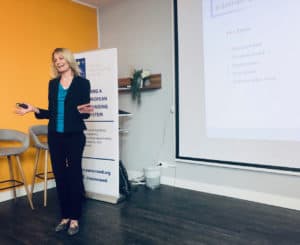 The fact that blockchain technology not only enables but even supports the incentive of human behaviour is an important aspect of the keynote address by Julie Maupin, Director of Social Impact and Public Regulatory Affairs at the IOTA Foundation.
The fact that blockchain technology not only enables but even supports the incentive of human behaviour is an important aspect of the keynote address by Julie Maupin, Director of Social Impact and Public Regulatory Affairs at the IOTA Foundation.
As a result, crowdfunding is now developing into a sharing economy. In particular, sustainability or environmental projects, such as recycling, benefit from rewards. This gives the technology the potential to solve real challenges on this planet.
Spotlight on: Blockchain Startups
Five selected use cases show: Blockchain technology is already being actively used in a wide variety of areas. The effects on alternative finance become very clear.
Real Market, for example, wants to make it easier for companies to access capital. CEO Dr. Dušan Gajić describes the secondary market solution for private equity as well as the equity crowdfunding platform of Real Market. By using blockchain technology, costs can be reduced by up to 80% and the duration of transactions can be massively shortened.
Jens Glaso, CEO and founder of BlockBonds, proves that Blockchain must focus on benefits rather than technology. His mobile banking app Spenn enables people without a bank account to carry out free financial transactions on their smartphones, for example in the Philippines, Rwanda, and Tanzania. Under the motto “banking the unbanked”, Spenn offers financial inclusion; through additional and ambassador programs, users can also earn money (“empowerment by employing”).
Finexity is one of the pioneers in tokenized real estate as an investment opportunity. Founder and CEO Paul Hülsmann offers digital investments in real estate from 500 euros with a term of one year. Thus Finexity simplifies the investment in tangible assets – without a notary and at a fraction of the otherwise incurred ancillary purchase costs. Using blockchain technology, it is possible to trade the shares on one’s own marketplace without forgery.
Fundament Group, a legal tech service provider that digitizes various asset investments, also relies on tokenization. Florian Glatz and his team offer a one-stop-shop for legal, technology and sales services to tokenize asset classes and create regulated financial instruments for a new, global investor market. Their first STO with a real estate volume of 250 million euros is about to be approved by BaFin.
The digital ID, which is often required, ensures Blinking. The patent-pending solution gives the user complete control over his private data and thus allows the secure process of digital onboarding. Thus, according to developer Matija Milekić, Blinking creates the digital foundations for the secure operation and use of crowdfunding platforms, crypto exchanges, and other trading platforms.
Regulation: Yes! But how?
That regulation is necessary is obvious and has been demanded by all parties involved. What it should look like, however, is controversial.
Even the third panel “Legal, policy and regulatory aspects for uptake”, moderated by Tilman Lüder of the European Commission, disagreed on the question of whether an STO can be structured like classical assets or whether new legal forms need to be found. Dr. Thomas Dünser, who heads the Financial Innovation staff unit in Liechtenstein and recently enforced the Blockchain Act there, was open to new models, while Graham Dick of Aquis Exchange Europe spoke of being able to imagine a hybrid solution.
Robert Michels of the law firm Dentons felt reminded of the times of the New Market and warns that the current situation is an invitation to fraud and called for a confident intervention by European regulators and equal treatment with regulated investment products.
Hagen Weiss, Senior Officer of the Federal Financial Supervisory Authority (BaFin), represented the position of the financial market regulator, who takes decisions on the admission of financial market instruments taking into account the political mandate and interpretation of existing laws. He brought the regulatory principle “substance over form” into play, in other words: “If it looks like a duck, swims like a duck, and quacks like a duck, then it probably is a duck”.
The question remained whether the existing financial market regulation (keywords: MiFID I and MiFID II) could withstand the new requirements of digitisation or whether there should be a completely new regulation that takes into account the principles of digital financial technologies from the outset.
What will the future bring?
The last panel, moderated by Sanja Ugrčić, Access to Finance Specialist at Cardno Emerging Markets Ltd, focused on the technical challenges. Dr. Veljko Petrović, Chief Research Officer of Real Market, recalls the beginnings of the Internet and believes that blockchain technology can have a similar revolution. But a lot of trust still needs to be built to complete the transformation.
“The Fintech industry shows how this can work“, says Blockchain pioneer Meinhard Benn. Payment systems like his company SatoshiPay are based on technologies that were conceived in the Internet age and are therefore much safer than online payments by technologically outdated credit cards or house banks.
Alexis Hamel of Solaris Bank sees the future of the blockchain in the mainstream, even though there is still a lot of educational work to be done. In this context, Pavel Kravchenko, founder of Distributed Labs, pointed out that the excesses that had emerged during the ICO run could not be ignored. It’s time for the established industries to take up the opportunities.
Overall, the panel believes that the private sector will benefit most from the technology. Far from Black Mirror scenarios, it has the potential to change society, make it more independent, and through barter and rewards, change to a more social togetherness.
Prof. Dr. Matthias Klaes of the University of Buckingham sees the ecosystem growing together in his closing remarks: Alternative financing models, distributed ledger technologies, blockchain, Fintech and tokenisation will overlap increasingly and form a unit.
Conclusion
The potential of the blockchain technology for alternative forms of financing and thus also for the crowdfunding industry is huge.
Even though there is still a lot of need for clarification and challenges regarding regulation, all participants were very open to actively shaping the change. This was also noticeable in the intensive exchange during the breaks (appropriately with snacks from Food & Beverages start-ups that were crowdfunded by ECN member Startnext) and at the subsequent Rooftop Afterparty to which Dentons and GP Bullhound had invited the conference participants.
The ECN working group already processed the findings of the conference on the following day. They will be included in the preparation of a white paper. In the coming months until the 8th ECN Crowdfunding Convention in Milan further use cases will be identified and analysed
 Christin Friedrich is Chair of the non-executive board of the European Crowdfunding Network (ECN) and leading the ECN working group on Exploring Blockchain for Alternative Finance. As CEO of Innovestment, a pioneer of equity-based crowdfunding founded 2011, she matched emerging technology growth companies with private investors in the DACH-region, raising 8M € for 40 companies. Innovestment joined ECN in 2013 as a founding member. Christin also supports and advises tech startups in the areas of finance, operations and investment strategy. Currently, she is also a member of the technology and innovation committee of the Chamber of Commerce and Industry of Berlin, helping to develop a digitalization strategy for the city of Berlin. Previously, she worked for management consultancies in Berlin and Hamburg and co-founded a tourism start-up in Iceland. She was also a board member of InvestHorizon, the European Investment Readiness Programme supported by the European Commission.
Christin Friedrich is Chair of the non-executive board of the European Crowdfunding Network (ECN) and leading the ECN working group on Exploring Blockchain for Alternative Finance. As CEO of Innovestment, a pioneer of equity-based crowdfunding founded 2011, she matched emerging technology growth companies with private investors in the DACH-region, raising 8M € for 40 companies. Innovestment joined ECN in 2013 as a founding member. Christin also supports and advises tech startups in the areas of finance, operations and investment strategy. Currently, she is also a member of the technology and innovation committee of the Chamber of Commerce and Industry of Berlin, helping to develop a digitalization strategy for the city of Berlin. Previously, she worked for management consultancies in Berlin and Hamburg and co-founded a tourism start-up in Iceland. She was also a board member of InvestHorizon, the European Investment Readiness Programme supported by the European Commission.


